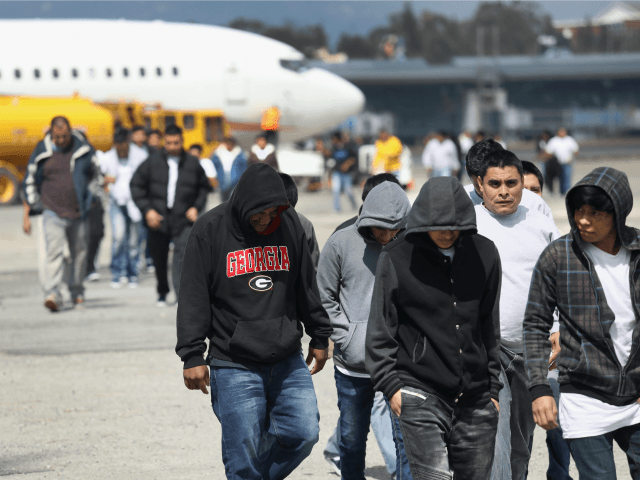President Donald Trump and the Department of Homeland Security condemned the Supreme Court’s decision to shield legal and illegal immigrants from deportation because of convictions for a ‘crime of violence’ not cited in the law.
The decision by the four-justice liberal bloc — plus one conservative justice, Neil Gorsuch — still allows federal officials to deport legal migrants for violent crimes listed in the deportation statute, such as murder, rape, or the sexual abuse of a minor, and it also invites Congress to add more particular crimes to the list.
Trump said the decision reinforces his call for immigration reforms, which Democrats and cheap-labor Republicans blocked on February 15:
Tyler Houlton, press secretary for the Department of Homeland Security, said:
Today’s ruling significantly undermines DHS’s efforts to remove aliens convicted of certain violent crimes, including sexual assault, kidnapping, and burglary, from the United States. By preventing the federal government from removing known criminal aliens, it allows our nation to be a safe haven for criminals and makes us more vulnerable as a result. The Secretary has met with hundreds of members of Congress over the last few months to implore them to take action on passing legislation to close public safety loopholes, such as these, that encourage illegal immigration and tie the hands of law enforcement.
The pro-American Immigration Law Reform Institute also blasted the court for negating the law instead of letting lower judges decide if the “crime of violence” applies in each deportation case:
IRLI commends the approach taken by Justice [Clarence] Thomas in his dissent – that of looking at the particular facts of the crime an alien committed to see if it carried a substantial risk of violence. That approach would save the provision in question by making it quite clear, and it would make our removal system both more efficient and more fair.
Lost in the debate over the meaning of ‘crime of violence’ is the fact that the alien was convicted twice of first-degree burglary under California state law and is now allowed to remain in the United States. That even President [Barack] Obama’s DHS wanted to deport Dimaya makes this fact even more disturbing.
Conservative judge Neil Gorsuch joined the four-justice bloc of progressive lawyers, giving them a 5:4 win over the other conservative justices. He agreed to clip the law because of a conservative argument which says vague laws grant too much power to aggressive government officials, saying:
The implacable fact is that this isn’t your everyday ambiguous statute. It leaves the people to guess about what the law demands—and leaves judges to make it up. You cannot discern answers to any of the questions this law begets by resorting to the traditional canons of statutory interpretation. No amount of staring at the statute’s text, structure, or history will yield a clue. Nor does the statute call for the application of some preexisting body of law familiar to the judicial power. The statute doesn’t even ask for application of common experience. Choice, pure and raw, is required. Will, not judgment, dictates the result.
Gorsuch explained his decision by saying he did not change the other part of the deportation law, and he invited Congress to expand the list of deportation-accelerating crimes, saying:
Vagueness doctrine represents a procedural, not a substantive, demand. It does not forbid the legislature from acting toward any end it wishes, but only requires it to act with enough clarity that reasonable people can know what is required of them and judges can apply the law consistent with their limited office …
It remains free, as well, to write a new residual clause that affords the fair notice lacking here. Congress might, for example, say that a conviction for any felony carrying a prison sentence of a specified length opens an alien to removal.
Congress, however, is unlikely to extend the list of crimes because pro-migration Democrats and cheap-labor Republicans will block the reforms, just as they voted to block Trump’s popular reforms on February 15.
Migrants’ lawyers celebrated the decision because it provides a possible escape hatch for legal migrants arrested for violent crimes which are not cited in the law. In this case, the legal migrant appealing his deportation was committing a burglary, which is not mentioned on the list even though it implies the burglar had decided to commit violence against property and likely against property owners.
The impact of the decision is unclear because enforcement officials can still deport people not in the country legally, even though huge networks of legal obstacles allow immigration lawyers to slow the process and reduce the numbers.
Lawyers also noted that their legal-immigrant clients can be deported for many categories of violent crimes:
The case is Sessions v. Dimaya, No. 15-1498 at the Supreme Court of the United States.
The article has been updated to emphasize that the deportation case was about a legal immigrant.

COMMENTS
Please let us know if you're having issues with commenting.